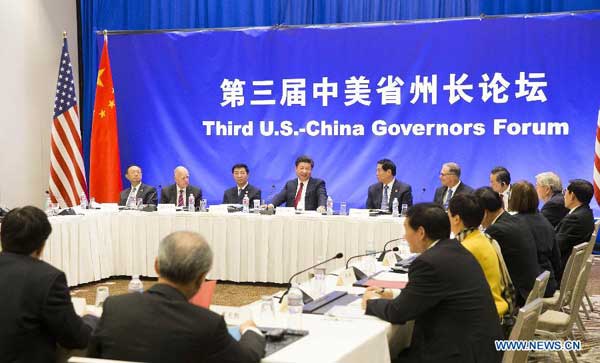States Aggressively Court Foreign Companies: International Firms Invested $353 Billion in the US economy in 2015

Charges of '"terrible" trade deals, the shipping of jobs overseas and the dangers of globalization dominated the presidential campaign. But many states are aggressively courting foreign companies to boost and diversify their economies.
"People make it too complicated," said Michigan's Republican Gov. Rick Snyder, a big proponent of foreign — especially Chinese — investment in his state. "Globalization is clearly a huge trend that’s been going on for some time and is only going to continue. If you want to be a strong economic engine … you have to engage."
In Snyder's and other Rust Belt states, US manufacturers left behind willing workforces and abandoned buildings when they departed. In California, foreign tech giants and pharmaceuticals are tapping a supply of skilled workers and access to North American markets.
Many states and regions are looking for foreign investors as a way to boost economic growth. At the same time, there is increasing interest among overseas firms in investing in the relatively stable US economy, said Brad McDearman, a nonresident senior fellow at the Brookings Institution who has extensively studied states and cities that have attracted investment by foreign companies.
With the reduction in domestic manufacturing and other industry because of plant closings and consolidations, as well as US. companies moving overseas, he said, "states and regions are recognizing the need to expand their efforts globally."
International firms invested $353 billion in the US economy in 2015, an all-time high and twice as much as in 2014, according to the Organization for International Investment, which represents the US operations of large foreign corporations.
Those deals included everything from Haier's acquisition of General Electric Co.’s appliances unit in Detroit for $5.6 billion to auto firm Ningbo Joyson Electronic Corp.'s purchase of Key Safety Systems, a Detroit manufacturer of auto safety devices like seatbelts and airbags, for $920 million.
Foreign investment boosts state and local economies in many ways: new factories, new US-based research and development, and the expansion of already established firms, the group said. But McDearman said that while states and cities obviously gain from foreign investment, it's sometimes hard to track benefits from mergers and acquisitions because the foreign companies are buying existing businesses. About 80 percent of the investment comes from mergers and acquisitions, he said, and those deals may start with just a few new employees or a few new product lines and grow slowly over time.
A much bigger immediate economic impact comes when a foreign firm builds a brand-new facility in a state or locality, such as Yuhuang Chemical Inc.'s $1.9 billion methanol plant in Louisiana or Vastly's $2 billion paper products plant in Virginia.
Big, new projects are what all the states are after, he said. "But there aren't a lot of them out there and that makes it even more competitive." Most foreign investment is not controversial. But in some instances, many times when China is involved, deals can prompt concerns that they may give foreign businesses and governments access to sensitive technology and threaten US security.
In a report to Congress on 2014 foreign investment, the Committee on Foreign Investment in the United States, a division of the US Treasury Department that monitors foreign deals, concluded that "foreign governments are extremely likely to continue to use a range of collection methods to obtain critical US technologies."
Snyder said those concerns are being mitigated by stiff technology security. "It's a concern across the board," he said, not just in foreign investment. Snyder, who made his fortune in the computer and venture capital businesses, said Michigan has been "emphasizing cybersecurity along with international trade and development."
Two analysts from the Rhodium Group, a consulting firm that helps governments and private investors track global trends and assess investment risks, noted that while some high-profile deals, particularly mergers, had been scotched because of cybersecurity concerns, the overall uptick in rejections of foreign investment by the Treasury Department had been a result of a greater number of investments — not more restrictive government policies.
The number of Chinese investments in the US increased from an average of 13 a year in the late 2000s to 43 a year in the early 2010s, according to the Rhodium analysts. The number of Chinese mergers and acquisitions in the US reached 100 in 2014 and 103 in 2015. In the first half of 2016, Chinese firms invested $18.4 billion in the US.
More Articles
- Department of Labor Awards $5M to Train, Expand Pathways for Women for Registered Apprenticeships, Nontraditional Occupations
- GAO Report, Older Households: Comparison of Income, Wealth, and Survival in the United States with Selected Countries
- Julia Sneden Wrote: Going Forth On the Fourth After Strict Blackout Conditions and Requisitioned Gunpowder Had Been the Law
- Rose Madeline Mula Writes: I’ve Got A Secret – NOT!
- GAO* Report, Cybersecurity: National Institutes of Health Needs to Take Further Actions to Resolve Control Deficiencies and Improve Its Program
- Voting Rights: Assistant Attorney General Kristen Clarke Testifies Before the Senate Judiciary Committee Hearing; “One of the most monumental laws in the entire history of American freedom”
- Journalist's Resource: Religious Exemptions and Required Vaccines; Examining the Research
- Jo Freeman Reviews Mazie's Hirono's Heart of Fire: An Immigrant Daughter's Story
- Rose Madeline Mula Writes: To Drive or Not To Drive — That Is The Question
- How are States Prioritizing Who Will Get the COVID-19 Vaccine First? CDC’s Advisory Committee on Immunization Practices (ACIP) Released an Interim Recommendation For the Highest Priority Group






